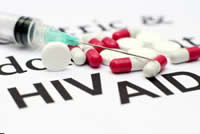After decades of HIV/AIDS, political barriers still restrict treatment
FEATURE / Experts say new trade negotiations could increase cost of providing life-saving drugs
Andi Schwartz / National / Friday, April 19, 2013
Despite decades of effort, barriers to HIV treatment still exist - and could be getting worse. Organizations are calling on
Canada to pull out of trade talks that could turn back years of activism and drive up the cost of treatment worldwide.
Stringent intellectual property (IP) provisions that would tighten brand-name pharmaceutical companies' monopoly on medicines
are showing up more and more in international trade agreements, says Canadian HIV/AIDS Legal Network Executive Director Richard Elliott.
Canada is currently in negotiations with the US and several other nations to form the Trans-Pacific Partnership (TPP), which,
leaked documents have revealed, includes provisions that go beyond the patent-protecting standards set out by the World Trade Organization,
called Trade-Related Aspects of Intellectual Property (TRIPS).
"What we've seen is very worrisome for us because it will increase the cost of medicines for any country in the agreement,"
says Judit Ruis, the US manager of the Access Campaign for Medecins Sans Frontieres/Doctors Without Borders (MSF).
 These "TRIPS-plus" proposals would effectively broaden what is included in a patent, extend the length of patents, and restrict opposition to patents, making it difficult for generic brands to manufacture drugs that are similar but cost less. These "TRIPS-plus" proposals would effectively broaden what is included in a patent, extend the length of patents, and restrict opposition to patents, making it difficult for generic brands to manufacture drugs that are similar but cost less.
Further provisions would allow companies to sue a government for denying a patent, including damages for lost revenue.
Pharmaceutical company Eli Lilly has filed a $100 million claim against the Government of Canada under this premise.
Elliott says the TPP will drive up costs for those using both public and private insurance plans in Canada.
"There are some very real things at stake for Canadians," he says.
In addition to the TPP, Canada is also in talks with the European Union to form the Comprehensive Economic and Trade Agreement (CETA), and
recently announced another multi-nation agreement in the works, the Trans-Atlantic Free Trade Agreement (TAFTA).
Columbians expect to see the effects of strict IP clauses following the US-Colombia Trade Promotion Agreement (TPA), which
took effect last May. A recent study estimates expenditures on medicines in Colombia will increase by $919 million by 2020, or
consumption of medicines will be reduced by 40 percent.
MSF is calling on Canada and all other countries involved in the TPP talks to reject the IP provisions suggested by the US.
"The lives of people, the rights to have access to medicines should always be the most important issue to any government
or stakeholder in trade agreements," says Ruis. "Having access means life or death."
When the WTO outlined TRIPS in 1994, it included exceptions for developing countries so they could still access lower-cost
generic medicines. Generic drug industries helped reduce the cost of antiretrovirals (ARVs), a medication for treating HIV, from $10,000
per person annually to $116 in a decade. As a result, the numbers of people living in low and middle income countries on ARVs rose
from 300,000 in 2002 to 6.6 million in 2010. There are currently eight million people receiving treatment for HIV, largely thanks
to the availability of generic medicines, says Ruis, noting that more than 80 percent of HIV medicines used in the developing
world are generics.
 The ideology behind increased IP provisions is also responsible for the rejection of a bill in November to make
the Canadian Access to Medicines Regime (CAMR) more user-friendly. CAMR was enacted in 2004 but has only been used once to deliver one
shipment of an AIDS medication to Rwanda - and even then it took three years to complete the process. The ideology behind increased IP provisions is also responsible for the rejection of a bill in November to make
the Canadian Access to Medicines Regime (CAMR) more user-friendly. CAMR was enacted in 2004 but has only been used once to deliver one
shipment of an AIDS medication to Rwanda - and even then it took three years to complete the process.
The NDP tabled the first reform bill in 2009 but it was amended to only include two key changes. After years of effort,
Parliament ultimately defeated it due, in short, to deliberate stalling, misinformation, and a whipped caucus, says Elliott.
Elliott attributes the decision to the power of brand-name pharmaceutical companies. He suggests the danger to these
companies of reforming CAMR is not the revenue lost to generic manufacturers, but the prospect of weighing IP rights against public health.
"If you're a monopolist, you don't want examples out there in the world of legislation or use of legislation that challenges
the hegemony on your monopoly," he explains. "Ultimately, it's the precedent it sets more so than money."
The current emphasis on IP threatens to undo decades of activism that won accessible, affordable treatment.
Although the 1980s saw the organization of counselling, education, and hospice services, the community needed more.
"It was a time when, if you hadn't seen a friend on the street, you'd start to wonder 'Shit, I wonder if he's still alive,'"
says Tim McCaskell, who co-founded AIDS Action Now (AAN) in 1988.
At that time, the only way to access potential life-saving drugs was to join medical trials, running the risk of being
placed in the placebo group and never receiving treatment at all. In addition, the Emergency Drug Release program, which would have
released the unapproved drugs to successful applicants, barred HIV and AIDS patients.
 "The barriers we were facing were not technical or medical barriers - they were political barriers," says McCaskell. "The barriers we were facing were not technical or medical barriers - they were political barriers," says McCaskell.
AAN pressured government officials and exposed authorities' refusal to use the EDRP for HIV patients to the media, and
eventually won access to the unapproved medicines.
Once treatments and accessibility started to improve, AAN began mounting a campaign for a "catastrophic drug plan" to
cover the cost of medicines above a certain percentage of one's income. Most people couldn't afford treatment and the government only
covered welfare recipients.
Through a series of stunts and protests, the issue gained attention and finally the government launched the Trillium Drug
Plan in Ontario in 1995.
Though there are still flaws, treatments and accessibility have dramatically improved in the province, which has almost
half of Canada's HIV cases. The most vulnerable and marginalized communities in Canada, such as refugees, undocumented citizens, and
those living in rural or isolated communities, have the most restricted access. There are still drugs that treat other HIV-related
infections not covered by the Trillium Drug Plan.
"The more wealthy you are, the more access you have," says McCaskell. "For the individual, it's enormously unjust, and
for society, it's enormously dangerous."
Elliott says while the struggle to get existing medicines to those in need continues, there remains a need for more
research and advancements in medical science. The profits-based system of stimulating research is flawed and results in a 10/90
gap, says Elliott, wherein only 10 percent of resources are spent on treating diseases that affect 90 percent of the world's
population. A system to complement or replace it is necessary.
"There's not much point in having new medicines unless there's access to them," he says.
###
Source: xtra.ca
For more HIV and AIDS News visit...
Positively Positive - Living with HIV/AIDS:
HIV/AIDS News
|